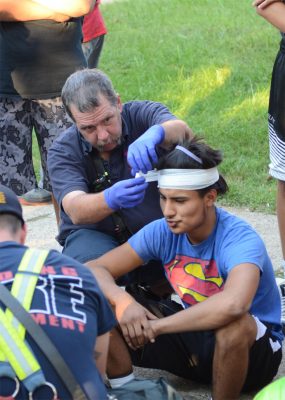Get the help you need right now 855-900-8437 Get Help Now
Get the help you need right now 855-900-8437 Get Help Now
July 14, 2018
For fire fighters, maintaining optimum wellness is a critical part of remaining active and effective on and off the job. Exposure to potentially traumatic events, life-threatening situations, and the physical strain of working long hours on little to no sleep can negatively impact a person’s overall mental health.
For fire fighters and their families, the prejudice and discrimination associated with mental health issues can be an obstacle for treatment. Not wanting to call attention to their struggles and preferring instead to focus on the job, many in the profession do not want to acknowledge they might need treatment.

Fire fighters see tragedies that many people may only experience once or twice in their life. The ravaging effects of fire, the emotional and physical damage caused by accident and abuse, stress, and an inability to save everyone they attempt to rescue can take a toll. Additionally, long shifts and other personal and financial issues can all contribute to the high rates of the mental health disorders commonly diagnosed among fire fighters.
The Substance Abuse and Mental Health Services Administration (SAMHSA) reports that about 43.8 million Americans in the United States were living with a mental health disorder in 2013. Fire fighters, compared to the public, are often diagnosed with higher rates of certain mental illnesses, including substance use disorder and post-traumatic stress disorder (PTSD).
There should be nothing stopping people with behavioral health disorders from connecting with treatment that could help them change their lives. Unfortunately,barriers to care can delay needed care. Some commonly cited reasons for not seeking treatment include:
An increase in prevention and education efforts across support organizations for fire fighters and paramedics, including organizations such as the National Fire Protection Association, has helped increase awareness of how common mental health issues are among fire fighters and improved access to appropriate care and treatment.
It’s important to note that there are various aspects of the job that can contribute positively to mental health. These include:
Finding balance when the negative issues begin to outweigh the positive is essential to maintaining optimum mental health. Making the difficult choice to enter treatment isn’t always an easy process.
Firefighting is a tough job — both mentally and physically — and fire fighters need to know it’s okay to talk about their struggles. You don’t have to battle PTSD or other behavioral health issues alone. Call the IAFF Center of Excellence to learn more about treatment options and support. Telephones are staffed around the clock with professionals who understand and can help.